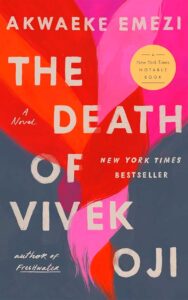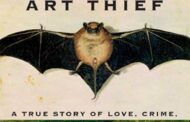BOOK SHORT
The Death of Vivek Oji
A Dazzling, Devastating Story
By Akwaeke Emezi
Review by Stephanie Miller

Vivek Oji is dead. Left behind are his high school friends in a small Nigerian town and his mother, gone dizzy and demanding in her desperation for information. In this captivating saga of a young person’s brief but glorious quest for living an authentic life, author and artist Akwaeke Emezi tells a dramatic story that begins the morning a mother opens the door to find her son’s body wrapped in colorful fabric lying on the doorstep.
The novel unfolds slowly, teasing out a puzzle to understand Vivek’s choices and how his friends support, protect, and guard him. Sexual and gender exploration abound as with most teens. But there is also lots of love amid the confusion of emotions and pressures of filial duty. At one point, Vivek’s cousin Osita advises, “You know what’s been happening in your head. You’re the only person who knows. So ask yourself if it feels right, and somewhere, deep inside you, there’s a compass that will tell you whether you’re right or wrong.”
Months after the death, Osita tries to convince Vivek’s mother to stop asking people about the day Vivek died. She can’t listen. In fact, she doubles down — pushing Osita and Vivek’s circle of friends relentlessly to find out why her son was killed. She sobs in a neighbor’s arms, “He was so young. Something happened. It doesn’t make sense. They took off his clothes when they left him there.”
Vivek’s friends struggle with loyalty to their friend and sadness for his mother’s suffering. One of them, Juju, “…wondered if Vivek’s mother deserved a bit more of the truth—if [Juju] and the others were hurting her every time she asked them the wrong questions and they gave her their careful answers.”
Misunderstood but Loved
We learn how this intense motherlove, beautiful and well-meaning as it is, only limited and pressured Vivek. We realize also why in Nigerian culture and with their specific family history, his mother remains in the dark about his true nature and activities. And we see a set of teenagers refuse to share their experiences with their parents, afraid of misunderstanding, anger, or worse, indifference.
This slim novel propels the story forward in a series of captured moments. Conversations, arguments, local lore, and dreams all seem taken out of context. Until the critical snapshots of time come together and reveal in the final pages who Vivek was. I went back to earlier chapters after finishing to read again. Now that I knew the full story and saw how much nuance I missed the first time. Well done, Akwaeke!
It’s not altogether clear if Vivek was understood by anyone, but he was loved. Perhaps that is all we can expect of each other.
Micro-Shorts
Solito, A Memoir, by Javier Zamora
This New York Times bestseller tells the story of Zamora’s repeated attempts at crossing from San Salvador to “La USA” when he was nine years old. Narrated by an innocent protagonist, much of the horror of crossing alone as a child is veiled, but my heart was racing just reading about the confusing inconsistencies among the adults whom he was told to trust. Everything from outright treachery, numbing fear, hunger, exhaustion, to loneliness.
Despite the incredible kindness and generosity of fellow travelers who adopt him as part of a makeshift “familia,” without whom Zamora would have been quickly abandoned by the “coyotes” who are paid to lead them across, there are moments along this harrowing journey when he craves nothing more than a warm hug from an understanding adult.
There is a lot of Spanish dialogue, which I had to look up. At first this was irritating, but then I realized it illustrates how hard it is to try to understand something so foreign simply from the context—just like Central and South Americans must quickly interpret the intent and requests of their US hosts. This is only one story from among the millions of people who try to come here for a chance at a better life but is an important one in these times of ongoing immigration debate.
Beyond the Pale and other stories by William Trevor
I found this 1982 collection at Brattle’s outdoor kiosk in Boston. But really, I want to recommend ANY story collection of William Trevor’s work. He’s been called the greatest short story writer of our time, a mantle I wholeheartedly endorse. His stories catch people in stride: Being arrogant, prideful, lonely, frightened, or naughty. Typically, a short story centers on one seminal life event, using it to highlight a personality trait, lifelong ambition, or cherished memory. Trevor is masterful at short form character development, using external and inner dialogue and memory to expose the complicated emotional dramas which center the stories.
His atmosphere stops me often. For example, “Sunlight touched the darkened glass in one of the two windows, drawing from it a glow that was not unlike the amber gleam of whiskey,” from “The Paradise Lounge.” Title story “Beyond the Pale” includes, “The two policemen towering in uniform and their actual slowness of intellect was rendered more noticeable by the lugubrious air tragedy had inspired in the hotel.”
I’m a student of opening lines, and short stories need amazing openers perhaps more than novels. “‘You couldn’t trust those eyes,’ people on Cap Fermat say, for they find it hard to be charitable where Mrs. Vansittart is concerned,” opens “The Bedroom Eyes of Mrs. Vansittart.” “Celia’s father would sit there, slowly eating oysters,” is the start of “Downstairs at Fitzgerald’s.” “On her high stool by the bar the old woman was as still as a statue,” begins “The Paradise Lounge,” which has a beautifully rendered twist in the tale.
Every story in this collection is a keeper. The characters are still with me. Is that not the greatest compliment for any writer?
This Other Eden, by Paul Harding (about Maine!)
Although Pulitzer Prize-winning author Paul Harding lives in New York, this novel is inspired by the true story of the Black and Indigenous residents of the Midcoast’s Malaga Island, who were forced to evict their homes. Many died soon after being placed in state institutions for the feeble minded. It was selected as a Maine Public “All Books Considered” book club. If you didn’t read it then, please read it now. It’s tender, magical, and haunting storytelling, revealing a slice of Maine history that has important reminders for our present time.





